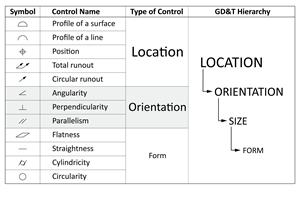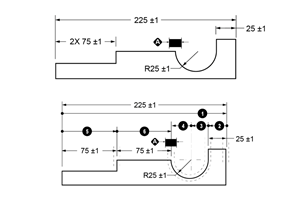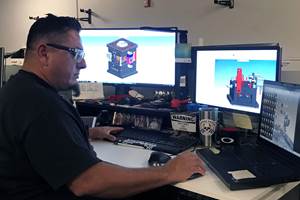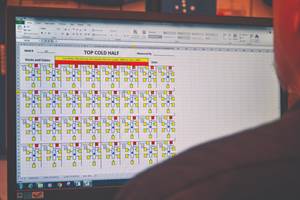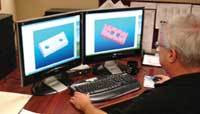Delcam Wins Third Queen’s Award for International Sales Success
On 21st April, Delcam, the UK’s leading developer of CADCAM software will be presented with the company’s third Queen’s Award for Enterprise in the International Trade category, and its sixth Award in total, in recognition of the continuing growth in world-wide sales of its manufacturing software and services.
This latest recognition of the company’s successful development and commercialisation strategies follows its receipt of three Queen’s Awards in the Innovation category for its ArtCAM engraving and routing software, its PowerINSPECT inspection software, and its dedicated software for the design and manufacture of dental restorations.
The Queen’s Awards are the UK’s most coveted commercial awards, with only a small percentage of those who enter each year measuring up to the demanding standards required to win an Award. Delcam is obviously extremely proud of its exceptional achievement in receiving its sixth Award in total and its second Award in consecutive years. “It is a strong endorsement of the commitment and skills of our development teams in producing excellent products, and of our sales staff in promoting and selling them worldwide,” said Delcam Chief Executive, Clive Martell.
The Award has been granted in recognition of Delcam’s consistent growth in its international sales over the six years from 2005 to 2010. The company saw its exports increase to up to £30 million annually over the period. It achieved record sales in 2010, recovering strongly after experiencing its first fall in annual sales during the 2009 recession.
Over the period covered by the Award, Delcam has continued to grow its business outside its traditional mould and die area, both in other areas of toolmaking, in particular press tool manufacture, and in other industries, such as the production of components for the aerospace and autosport industries. Delcam has also been successful in applications where CADCAM technology is not so familiar, in particular, jewellery, signmaking and woodworking.
The diversification has been supported by a number of acquisitions. The addition of the FeatureCAM range, for feature-based programming, and the PartMaker family, for Swiss-type lathes and turn-mill equipment, has given Delcam the broadest range of machining software from any single developer. This means that the company can offer smaller companies the specific software they need, rather than a compromise solution, and that it can provide larger companies with systems for all of their programming needs. It has been a key factor in making Delcam the leading specialist supplier of CAM software and services for the last ten years in the rankings published by leading US analysts CIMdata.
Delcam also acquired CRISPIN, the specialist developer of software for the design and manufacture of footwear. The combination of products and expertise from the two companies gave the industry a clear leader, both in market share and in breadth of technology. Delcam CRISPIN is now the only company able to provide a complete solution for the design and manufacture of lasts, uppers and soles for all types of footwear, including fashion shoes, sports shoes and orthopaedic footwear.
More recently, Delcam has established a Healthcare Division to provide a greater focus on this increasingly important part of its business. The Division helps companies across the medical, dental and associated industries to apply Delcam’s expertise and experience in taking advantage of the latest design and manufacturing techniques. In addition, the company has introduced several specific products for the healthcare market. These include the DentCAD and DentMILL programs for the design and manufacture of dental restorations and the OrthoModel and OrthoMill software for the development of orthotics.
The growth in sales has been matched by a rapid increase in Delcam’s international customer base. During last year, the company announced its 35,000th customer, Southern Spars, a New Zealand-based manufacturer specialising in the design and construction of spars and rigging for high-performance yachts.
Related Content
Tolerancing in Mold Design, Part 2: Using GD&T to Address Conventional Tolerancing Issues
Mold designers can achieve a single interpretation of workpiece functionality when following the American Society of Mechanical Engineers Geometric Dimensioning and Tolerancing standard.
Read MoreTolerancing in Mold Design, Part 1: Understanding the Issues of Conventional Bilateral Tolerancing
Mold designers must understand the location, orientation and form limitations of conventional tolerancing before changing to another dimensioning system.
Read MoreMold Design Review: The Complete Checklist
Gerardo (Jerry) Miranda III, former global tooling manager for Oakley sunglasses, reshares his complete mold design checklist, an essential part of the product time and cost-to-market process.
Read MoreWhat is Scientific Maintenance? Part 2
Part two of this three-part series explains specific data that toolrooms must collect, analyze and use to truly advance to a scientific maintenance culture where you can measure real data and drive decisions.
Read MoreRead Next
Faster Turns and Higher Accuracy with CAM
The right CAM software package investment paid for itself in less than a year and contributed to one mold builder’s ability to produce complex molds quickly and accurately.
Read MoreReasons to Use Fiber Lasers for Mold Cleaning
Fiber lasers offer a simplicity, speed, control and portability, minimizing mold cleaning risks.
Read MoreHow to Use Continuing Education to Remain Competitive in Moldmaking
Continued training helps moldmakers make tooling decisions and properly use the latest cutting tool to efficiently machine high-quality molds.
Read More











